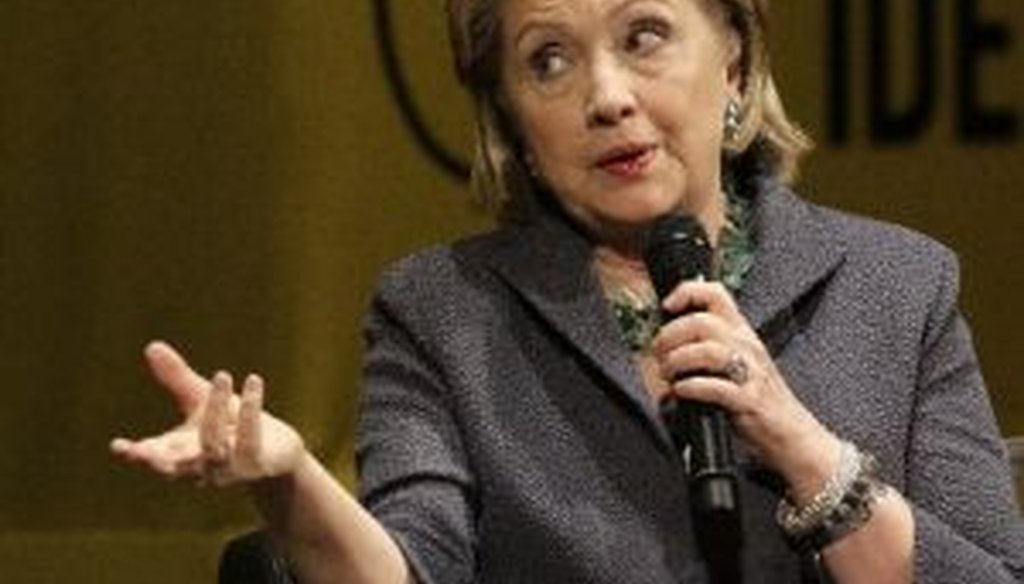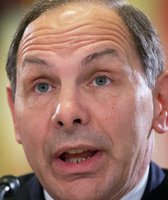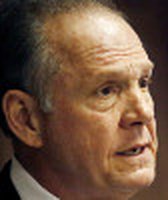Stand up for the facts!
Our only agenda is to publish the truth so you can be an informed participant in democracy.
We need your help.
I would like to contribute

Former Secretary of State Hillary Clinton answers a question from the crowd during a stop on her book tour in Chicago, on June 11, 2014.
Will she? Won’t she?
For more than a decade, Hillary Clinton’s presidential aspirations have lingered around the political rumor mill. Would she take on President George W. Bush in 2004? Would 2008 be her year? Would she dare leave the State Department to mount a primary challenge to President Barack Obama in 2012? Is she ready to run again in 2016?
Publication of Hard Choices, Clinton’s memoir of her time as Secretary of State, will only feed the speculation about her 2016 plans. In it, she portrays herself as a shrewd but pragmatic diplomat, and she responds sharply to Republican criticisms of her time at the State Department.
Mostly, though, it’s a long-winded resume of someone who at least wants to appear ready for another run at the White House.
Clinton’s book begins in 2008 as she bowed out of the presidential contest and eventually — and, she writes, reluctantly — joins Obama’s cabinet as Secretary of State.
Sign up for PolitiFact texts
From there, she meticulously goes through dozens of crises, region by region, depicting a complex world of difficult decisions and a United States with diminished international standing after the Bush years. She recounts the decision-making behind Obama’s troop surge in Afghanistan, explains the "reset" with Russia, and describes the tense moments in the Situation Room watching SEAL Team Six take out Osama bin Laden.
Clinton also takes on two issues where her critics continue to pound her: supporting the Iraq War and the 2012 attacks on the U.S. compound in Benghazi.
On Iraq, she is apologetic. "I still got it wrong," she says. "Plain and simple." And while she takes blame for the death of Ambassador Chris Stevens in Libya, she strikes back at those who continue to question the administration’s response.
Still, it’s largely a politically risk-averse account that plays up her role in dozens of international conflicts without ruffling too many feathers. In that sense, it is starkly different than Duty, the memoir by Robert Gates, who served as Defense Secretary under both Republican and Democratic presidents. While both authors pull back the curtain on the inner workings of the current administration, Gates is highly critical of many Washington players, including Vice President Joe Biden, and of the Beltway culture. By contrast, Clinton takes few shots — and even has nice things to say about Bush and his paintings.
Ultimately, it’s a somewhat pedantic read — so cautiously written, and so free of politically charged rhetoric, that it proved difficult for PolitiFact to find too many factual faults with it.
Indeed, the most inaccurate comment we explored came from Clinton’s book tour, not the book itself. When Clinton appeared on ABC with Diane Sawyer, the former first lady was pressed on the $5 million she reportedly earned in speaking fees.
"You have no reason to remember, but we came out of the White House not only dead broke, but in debt," Clinton said. "We had no money when we got there, and we struggled to piece together the resources for mortgages for houses, for Chelsea's education. It was not easy."
Clinton’s "dead broke" comment elicited eye-rolls from Republicans, and we found it to be dubious as well. While incomplete earnings reports perhaps showed more debt than assets, a balance sheet does not tell the full story. The experts we reached said the Clintons’ earning potential had a real economic value that the financial sector traditionally acknowledges and is willing to bank on. We rated her statement Mostly False.
The handful of checkable facts we looked at from the 656-page book itself were largely accurate, we found.
For instance, Clinton discusses how her relationship with Gates was one of collaboration, atypical of the inter-cabinet turf wars of past administrations. When Gates’ Pentagon pushed for more troops in Afghanistan, the two also worked together to get more State Department personnel in the country to focus on local and diplomatic issues.
Clinton boasts the positive results from the dual efforts, noting that "by the time I left State, the Afghans had made progress. Economic growth was up and opium production was down. Infant mortality declined by 22 percent. Under the Taliban only 900,000 boys and no girls had been enrolled in schools. By 2010, 7.1 million students were enrolled, and nearly 40 percent of them were girls."
We found her claims about school enrollment, infant mortality, and economic growth to be basically accurate, but her take on opium production is somewhat exaggerated. We rated the statement Mostly True.
One of the most controversial passages in the book politically was Clinton’s strong endorsement of Obama’s policy of using drones to kill terrorists overseas. Clinton defended Obama’s heavy reliance on armed, unmanned aircraft to take out top al-Qaida officials, even as foreign leaders made clear to her their opposition to the policy and concerned Middle East citizens voiced their concerns directly to her.
Clinton argued that drones were a critical tool in fighting terrorism without risking American lives. By 2009, she said, "it was widely known that dozens of senior terrorists had been taken off the battlefield by drones, and we later learned that bin Laden himself worried about the heavy losses that drones were inflicting."
There’s no public headcount, but we were able to confirm the number of senior terrorists killed through 2009 was at least a couple dozen. We rated this statement True.
Clinton’s take on the Sept. 11, 2012 Benghazi attack was the most anticipated chapter in the book. In it, she laments the loss of Stevens, whom she knew personally, and outlines the events that led to his death as well as the U.S. response to the attack on the Benghazi compound.
What hampered the American response to the attack? Clinton said one reason is the U.S. military footprint in Africa is "nearly nonexistent."
The United States has only had an African Command since 2008, and it is largely focused on working with African countries to train troops. There is very little military infrastructure, combat troops, or heavy firepower. There is just one military base — 2,000 miles from Benghazi in Djibouti — and the headquarters is actually in Germany.
While other military assets were located closer in Europe, on this narrow question, several African and international military experts said Clinton had a point. We rated the claim True.
Just because the book included some accurate facts doesn’t mean her views will stand up to scrutiny in the presidential campaign. But her carefully vetted book mirrors the tightly-crafted image she has publicly maintained throughout her political career.
On the larger question of whether she will run for president, Clinton gave no direct hints. "The answer is, I haven’t decided yet," she wrote.
Our Sources
See original Truth-O-Meter items.




















































